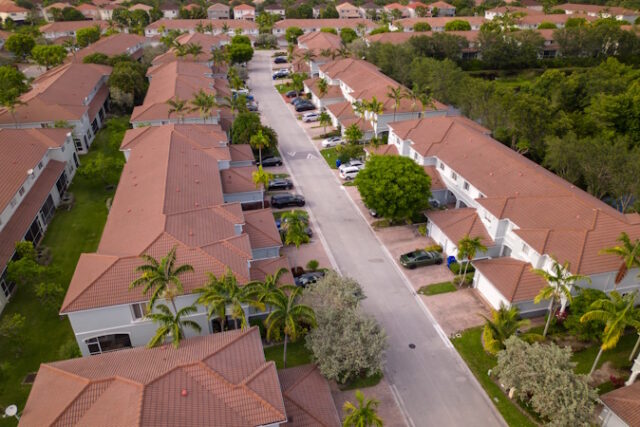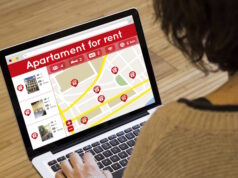
If you’re thinking about planting permanent roots in the Sunshine State, you’re joining quite the crowd. According to data from the U.S. Census Bureau, Florida was the number-one state for net migration in 2022 — in fact, between July 2021 and July 2022 it welcomed more than 1,200 new residents each day.
As you can imagine, this popularity makes for a rather competitive housing market in the state, and while living here can put you near the beach all year long, the homebuying process isn’t always so sunny. Read on for everything you need to know about how much it costs to buy a house in Florida.
How much does it cost to buy a house?
The median sale price of a single-family home in Florida is $409,243, according to Florida Realtors’ September 2023 market report. If you’re comfortable with a smaller space, you’ll be rewarded with a smaller price: The median price of a condo or townhouse is $324,990.
This state covers a lot of ground, and home prices can look very different depending on where in the state you’re located. Consider these median prices in some of the best places to live in Florida:
- Miami-Fort Lauderdale-West Palm Beach: $600,000
- Jacksonville: $385,000
- Orlando-Kissimmee-Sanford: $435,000
- Tallahassee: $326,213
- Tampa-St. Petersburg-Clearwater: $415,000
- North Port-Sarasota-Bradenton: $499,945
While it’s important to understand how sale prices vary across the state, you’ll need to zero in on how that translates to monthly mortgage payments. For example, Bankrate’s mortgage calculator shows that, assuming a 30-year loan at 7.5 percent interest with 20 percent down, the principal and interest payments on a median-priced $600,000 Miami home would be $3,356. In the capital of Tallahassee, where the median price is nearly half that at just $326,213, that figure would be a much lower $1,824.
Down payment
Making a big down payment in advance will lower your ongoing monthly costs. Contrary to popular belief, you don’t necessarily need to put down a full 20 percent of the purchase price — but if you do, you avoid having to pay an additional monthly fee for private mortgage insurance. Here are the minimum down payment requirements qualified borrowers must meet for the most popular mortgage programs:
- Conventional loans: 3 percent
- FHA loans: 3.5 percent (with a credit score of 580 or higher), 10 percent (with a credit score between 500 and 579)
- VA loans: No down payment if you qualify
- USDA loans: No down payment if you qualify
If saving up enough for a down payment is daunting, help is available. The state offers first-time homebuyer programs for qualifying borrowers, and there are other down payment assistance options out there as well.
Closing costs
The most recent figures from Core Logic’s ClosingCorp show that the average closing costs in Florida tack on 2.3 percent of the purchase price. That’s on the high side — its neighbors to the north have much lower rates: 1.3 percent in Georgia and 1.4 percent in Alabama. On a median-priced $409,243 Florida home, 2.3 percent comes to $9,412.59 in closing costs.
This amount isn’t shouldered entirely by the buyer, though; closing costs are split between both parties. Common closing costs for buyers include home appraisal and home inspection fees, both of which will likely run a few hundred dollars. Don’t forget to leave some breathing room in your bank account to cover regular maintenance and potential emergencies.
Cost to move
Once you buy a house in Florida, you need to figure out how to get all your belongings there. If you’re already a local, your moving budget won’t look too overwhelming: According to HomeAdvisor, the average cost of a local move is $1,702. However, if you’re one of the people looking to relocate to Florida from another state, be prepared to spend a lot more: The national average for a cross-country move is $4,617.
Homeownership costs
You’ll also need to consider the ongoing costs to actually own and maintain a Florida home. If your home is part of a homeowners association, you’ll need to budget for HOA fees — these vary widely depending on what kind of services and amenities the community provides.
Insurance giant State Farm recommends setting aside somewhere between 1 and 4 percent of your home’s value to cover annual home upkeep. On a median-priced $409,243 Florida home, that means you might need to earmark between $4,092 and $16,369 each year to keep your house in good condition.
Even if you get through the year with minimal maintenance issues — the AC doesn’t break, and the dishwasher is running perfectly — you’re still going to need to pay the government. The typical Florida homeowner paid $4,085 in property taxes in 2022, according to a report from ATTOM Data Solutions.
Finally, you need to protect your property with homeowners insurance. And securing home insurance in Florida, which is so prone to hurricanes and other storms, can be tricky. It’s also very expensive: The typical Florida homeowner pays around $6,000 per year, more than four times the average of around $1,700 for homeowners elsewhere, according to analysis from the Insurance Information Institute.
- The home insurance market in Florida is in crisis. Since 2017, many insurance carriers have left the state, gone insolvent or tightened their underwriting restrictions, making it difficult for homeowners to find coverage. Many of the companies that remain have chosen not to renew existing policies, leaving owners in the lurch.
- Fraudulent roofing claims are mostly to blame, and the devastating effects of Hurricane Ian in September 2022 complicated the issue further. According to a report from the governor’s office, Florida accounts for 79 percent of the country’s home insurance lawsuits.
- New insurance-reform laws went into effect in 2022 to try to stabilize the situation, but it may be some time before these laws produce meaningful results, and homeowners could see premiums that exceed several thousand dollars a year. Before you buy a Florida home, consult closely with your real estate agent, and possibly a local attorney, to determine whether the property will be insurable at a cost you can afford.
Reducing costs to buy a house
If you’re hoping to reduce your homebuying costs, consider these steps toward some savings:
- Negotiate for seller concessions: While much of Florida is still a seller’s market due to high demand and low inventory, that doesn’t necessarily mean that sellers won’t help you get a deal across the finish line. Asking the seller to cover some of your repairs or closing costs can’t hurt.
- Buy a smaller home in a more affordable location: A five-bedroom home on the beach might sound perfect, but it might not be perfect for your budget. Consider casting a wider net with your home search to save more money in the short-term. It doesn’t have to be your forever home, just what’s right for you right now.
- Wait: Speaking of which, mortgage rates aren’t likely to stay this high forever. Holding off on buying until they come down a bit can save you serious money. For example, according to Bankrate’s mortgage calculator, the difference between an 8 percent interest rate and a 7 percent one on a median-priced Florida home will save you $224 in principal and interest payments each month (assuming a 20 percent down payment on a 30-year loan).
Next steps
If you think you’re ready to dive into the Florida housing market, be sure to have an experienced local real estate agent by your side. The market here is unique in a lot of ways, and it’s crucial to have an expert to guide the way. An agent who knows your area well can help you find a home that works for your budget and meets your family’s needs, and can help with the paperwork and smooth over any bumps in the road that might arise.
FAQs
How much should I have saved to buy a house in Florida?
Both the buyer and the seller will pay their part of the closing costs in Florida (as in every state). However, these are often negotiable: Depending on which side of the bargaining table you’re on, you can ask the other party to help cover some of the final expenses.
Is the cost to buy a house in Florida higher compared to elsewhere?
The median sale price of a single-family house in Florida was $409,243 as of September 2023, according to data from Florida Realtors. That’s around $15,000 higher than the National Association of Realtors’ nationwide median price for the same month: $394,300.
This article originally appeared here and was republished with permission.












